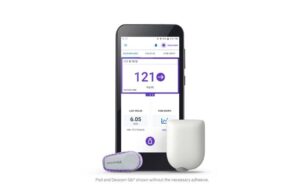
Acton, Massachusetts–based Insulet’s Omnipod 5 significantly improved time in range and reduced HbA1c in children aged 2 through 5.9 years old with type 1 diabetes over 12 months of use, according to the company. Earlier this year, the Omnipod 5 became the first tubeless, wearable automated insulin delivery system cleared for marketing in the U.S.
The data, collected from a pivotal trial extension, was presented at the American Diabetes Association (ADA) 82nd Scientific Sessions in New Orleans, Louisiana, according to a news release.
“One of our biggest goals in the development of Omnipod 5 was to ease the burden that type 1 diabetes places on families and caregivers of this vulnerable age group,” Insulet SVP and Medical Director Dr. Trang Ly said in the release. “With these preschool extension trial results, we have demonstrated improved glycemic results over the long term for very young children managing diabetes. I’m incredibly proud of this remarkable achievement and know that Omnipod 5 will have a big impact on these families.”
Original data from a three-month pivotal trial showed Omnipod 5 to be safe and effective, significantly improving time in range and reducing HbA1c in 80 children between 2 and 5.9 with type 1 diabetes. Participants were invited to continue using Omnipod 5 in an ongoing 12-month (plus) extension and 100% elected to continue.
After all participants completed 12 months total (three in the original study plus nine in the extension), average HbA1c totaled 6.9%, compared with 7.4% at baseline and 6.9% at the end of three months. Time in range during months 10-12 of use was 67.6%, compared to 57.2% during standard therapy and 68.1% during the three-month pivotal trial.
Percent time in hypoglycemia was reduced compared with standard therapy, with the median totaling 1.9% during months 10-12 of use, compared to 2.2% during standard therapy and 1.9% during the first three months.
The data demonstrated continued improved outcomes compared with baseline through 12 months of system use, including lower HbA1c and greater time in range, plus there were no episodes of diabetic ketoacidosis (DKA) or severe hypoglycemia.
“I’m delighted to report that the safety and improved glycemic outcomes from the initial three-month pivotal study in pre-school aged children continued for an additional nine months, indicating the potential long-term benefit of the Omnipod 5 system in very young people with type 1 diabetes,” Baylor College of Medicine’s Dr. Daniel DeSalvo said. “It is particularly challenging for caregivers to manage diabetes in children under six, given their unpredictable eating habits and activity levels. These results, along with the system’s tubeless form factor and ease of use, make Omnipod 5 an excellent choice for automated insulin delivery in this age group, not only for optimizing glycemic outcomes but for alleviating the burden of diabetes for the entire family.”

